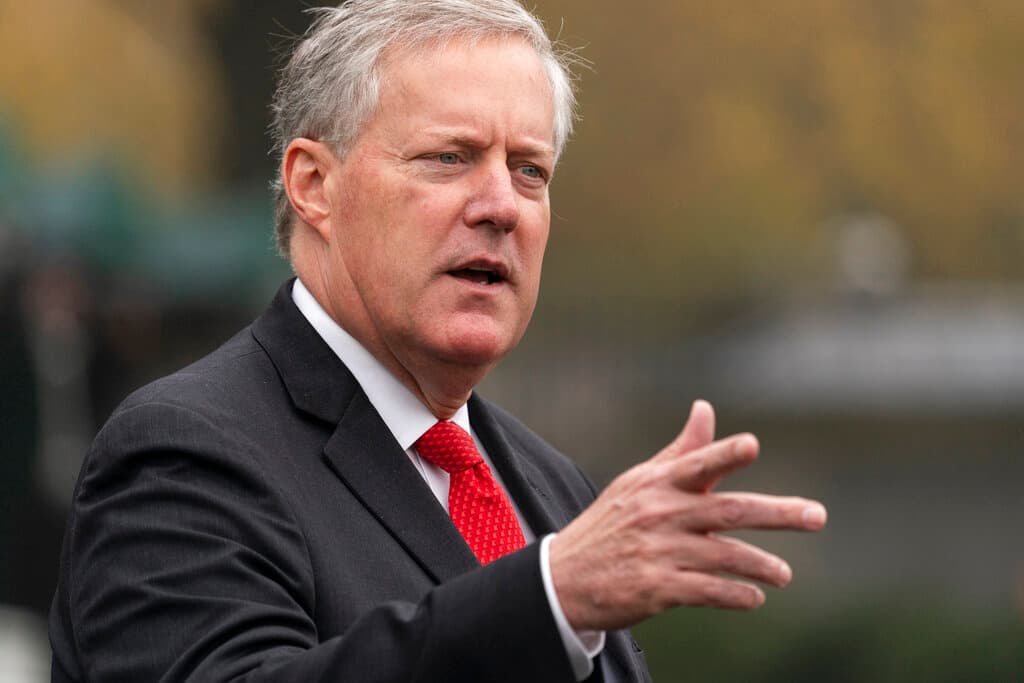Arizona Charges Giuliani, Meadows, Eastman With Scheming To Overturn 2020 Election; Trump Is an Unindicted Co-Conspirator
The Grand Canyon State is the latest to hand up charges alleging a criminal conspiracy to overturn the result of the 2020 election.

PHOENIX — The indictment by an Arizona grand jury of Chief of Staff Mark Meadows, Mayor Giuliani, and 16 others on fraud, forgery, and conspiracy charges marks a new era in the effort to prosecute those who attempted to overturn the result of the 2020 election. President Trump is an unindicted co-conspirator
The indictment released Wednesday names 11 Republicans, including the attorney Boris Epshteyn, who submitted a document to Congress falsely declaring that Mr. Trump defeated President Biden in Arizona in the last presidential election. It also features seven other defendants whose names were not immediately released because they had not yet been served.
The Associated Press was able to determine the identities of the unnamed defendants based on their descriptions in the indictment.
One is described as an attorney “who was often identified as the Mayor” and spread false allegations of election fraud, a description that clearly describes Mr. Giuliani. Another is described as Mr. Trump’s “chief of staff in 2020,” which describes Mr. Meadows.
Attorney General Kris Mayes, a Democrat, said in a video statement “I will not allow American democracy to be undermined. It’s too important.”
The 11 people who had been nominated to be Arizona’s Republican electors met at Phoenix on December 14, 2020, to sign a certificate saying they were “duly elected and qualified” electors and claiming that Mr. Trump carried the state. A one-minute video of the signing ceremony was posted on social media by the Arizona Republican Party.
The document was later sent to Congress and the National Archives, where it was ignored. Mr. Biden won Arizona by more than 10,000 votes. Of the eight lawsuits that unsuccessfully challenged Mr. Biden’s victory in the state, one was filed by the 11 Republicans who would later sign the certificate declaring Mr. Trump as the winner.
Their lawsuit asked a judge to de-certify the results that gave Mr. Biden his victory in Arizona and block the state from sending them to the Electoral College. In dismissing the case, a district court judge, Diane Humetewa, said the Republicans lacked legal standing, waited too long to bring their case and “failed to provide the court with factual support for their extraordinary claims.”
Days after that lawsuit was dismissed, the 11 Republicans participated in the certificate signing. The Arizona charges come after a string of indictments against fake electors in other states.
In December, a Nevada grand jury indicted six Republicans on felony charges of offering a false instrument for filings. They have pleaded not guilty.
Michigan’s Attorney General, Dana Nessel, in July filed felony charges that included forgery and conspiracy to commit election forgery against 16 Republican “alternate electors.” One had charges dropped after reaching a cooperation deal, and the 15 remaining defendants have pleaded not guilty.
Three fake electors also have been charged in Georgia alongside Mr. Trump and others in a sweeping indictment accusing them of participating in a wide-ranging scheme to illegally overturn the results. They have pleaded not guilty.
In Wisconsin, 10 Republicans who posed as electors settled a civil lawsuit, admitting their actions were part of an effort to overturn Biden’s victory. There is no known criminal investigation in that state.
Mr. Trump also was indicted in August in federal court over the fake electors scheme. The indictment states that when Trump was unable to persuade state officials to illegally swing the election, he and his Republican allies began recruiting a slate of fake electors in battleground states — Arizona, Georgia, Michigan, New Mexico, Nevada, Pennsylvania and Wisconsin — to sign certificates falsely stating he, not Mr. Biden, had won their states.
In early January, New Mexico Attorney General Raúl Torrez said that his state’s five Republican electors cannot be prosecuted under the current law. In New Mexico and Pennsylvania, alternate electors added a caveat saying the election certificate was submitted in case they were later recognized as duly elected, qualified electors. No charges have been filed in Pennsylvania.
None of the 11 Arizona defendants responded to either phone, email or social media messages from The Associated Press on Wednesday seeking comment.
___
Associated Press writers Jonathan J. Cooper in Phoenix, Kate Brumback in Atlanta and Marc Levy in Harrisburg, Pennsylvania, contributed to this report.
